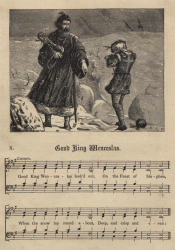Boxing Day
Boxing Day (pg.11, The Flight of Gemma Hardy)
This is a holiday of British origin. The Oxford dictionary traces its earliest print attribution to 1833, four years before Charles Dickens mentioned it in his work The Pickwick Papers. Boxing Day became a national holiday in England under Queen Victoria in 1871. The exact roots of the holiday's name is unknown, but there are two theories as to how this holiday came about and both are connected to the act of charity being distributed to lower classes on the day after Christmas.
One idea is that December 26 was the day where centuries ago lords of the manor and aristocrats typically distributed 'Christmas boxes' that were often filled with small gifts, money and leftovers from Christmas to their household servants and employees. The other theory is that Boxing Day came about from the alms boxes that were placed in churches during Advent season for the collection of monetary donations to the poor on December 26, which is also the feast of St. Stephen, the first Christian martyr and figure known for acts of charity. Boxing Day was mentioned in Livesey's The Flight of Gemma Hardy, when Gemma revealed on page eleven that she opened her package on Boxing Day. That scene is in accordance to the holiday's first theory, which is that Gemma was seen more as someone of lower class, like a servant amongst her own family, as she did not partake in present opening with her family on Christmas day.
Bibliography
Source of Information: Klein, Christopher. "Why is the Day After Christmas Called Boxing Day?" history. com. HISTORY. 22 Aug. 2018. Web. Date Accessed, 25 Sept. 2019. https://www.history.com/news/why-is-the-day-after-christmas-called-boxing-day
Livesey, Margot. The Flight of Gemma Hardy. HarperCollins, 2012.
Source of Image: https://en.wikipedia.org/wiki/Good_King_Wenceslas

